- Home
- Quizzes
- My Quiz Activity
- Newsletters
- Sports Betting
- MY FAVORITES
- Add Sports/Teams
- SPORTS
-
NFL
- NFL Home
- Arizona Cardinals
- Atlanta Falcons
- Baltimore Ravens
- Buffalo Bills
- Carolina Panthers
- Chicago Bears
- Cincinnati Bengals
- Cleveland Browns
- Dallas Cowboys
- Denver Broncos
- Detroit Lions
- Green Bay Packers
- Houston Texans
- Indianapolis Colts
- Jacksonville Jaguars
- Kansas City Chiefs
- Las Vegas Raiders
- Los Angeles Chargers
- Los Angeles Rams
- Miami Dolphins
- Minnesota Vikings
- New England Patriots
- New Orleans Saints
- New York Jets
- New York Giants
- Philadelphia Eagles
- Pittsburgh Steelers
- San Francisco 49ers
- Seattle Seahawks
- Tampa Bay Buccaneers
- Tennessee Titans
- Washington Commanders
-
MLB
- MLB Home
- Arizona Diamondbacks
- Atlanta Braves
- Baltimore Orioles
- Boston Red Sox
- Chicago White Sox
- Chicago Cubs
- Cincinnati Reds
- Cleveland Guardians
- Colorado Rockies
- Detroit Tigers
- Houston Astros
- Kansas City Royals
- Los Angeles Angels
- Los Angeles Dodgers
- Miami Marlins
- Milwaukee Brewers
- Minnesota Twins
- New York Yankees
- New York Mets
- Oakland Athletics
- Philadelphia Phillies
- Pittsburgh Pirates
- San Diego Padres
- San Francisco Giants
- Seattle Mariners
- St. Louis Cardinals
- Tampa Bay Rays
- Texas Rangers
- Toronto Blue Jays
- Washington Nationals
-
NBA
- NBA Home
- Atlanta Hawks
- Boston Celtics
- Brooklyn Nets
- Charlotte Hornets
- Chicago Bulls
- Cleveland Cavaliers
- Dallas Mavericks
- Denver Nuggets
- Detroit Pistons
- Golden State Warriors
- Houston Rockets
- Indiana Pacers
- Los Angeles Clippers
- Los Angeles Lakers
- Memphis Grizzlies
- Miami Heat
- Milwaukee Bucks
- Minnesota Timberwolves
- New Orleans Pelicans
- New York Knicks
- Oklahoma City Thunder
- Orlando Magic
- Philadelphia 76ers
- Phoenix Suns
- Portland Trail Blazers
- Sacramento Kings
- San Antonio Spurs
- Toronto Raptors
- Utah Jazz
- Washington Wizards
-
NHL
- NHL Home
- Anaheim Ducks
- Arizona Coyotes
- Boston Bruins
- Buffalo Sabres
- Calgary Flames
- Carolina Hurricanes
- Chicago Blackhawks
- Colorado Avalanche
- Columbus Blue Jackets
- Dallas Stars
- Detroit Red Wings
- Edmonton Oilers
- Florida Panthers
- Los Angeles Kings
- Minnesota Wild
- Montreal Canadiens
- Nashville Predators
- New Jersey Devils
- New York Islanders
- New York Rangers
- Ottawa Senators
- Philadelphia Flyers
- Pittsburgh Penguins
- San Jose Sharks
- Seattle Kraken
- St. Louis Blues
- Tampa Bay Lightning
- Toronto Maple Leafs
- Vancouver Canucks
- Vegas Golden Knights
- Washington Capitals
- Winnipeg Jets
- NCAAF
- NCAAM
- Boxing
- Entertainment
- Lifestyle
- Golf
- MMA
- Soccer
- Tennis
- Wrestling
- More Sports
- RESOURCES
- My Account
- YB on Facebook
- YB on Twitter
- YB on Flipboard
- Contact Us
- Privacy Policy
- Terms of Service
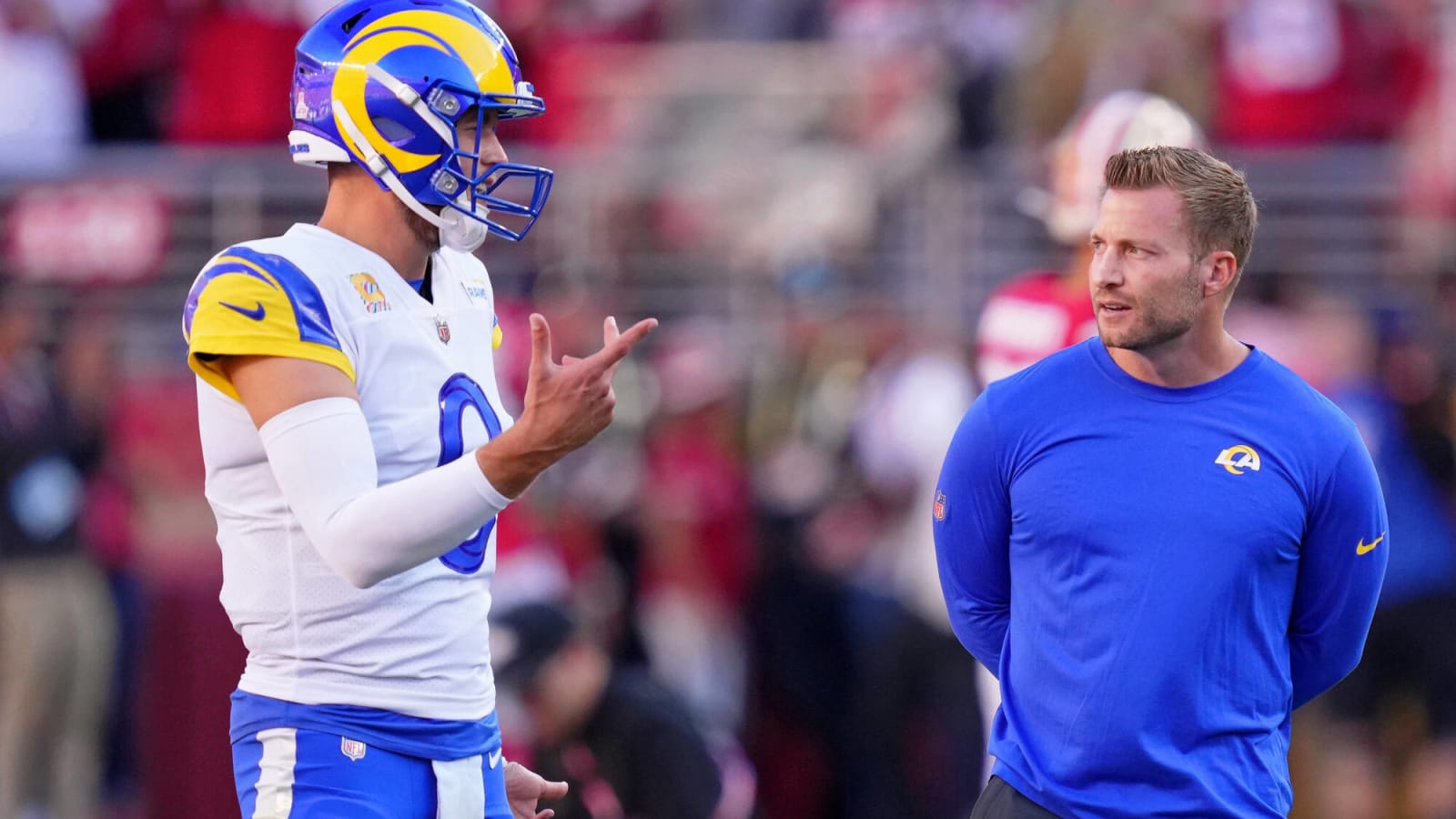
The most notable single-season declines in NFL history
As turnaround success stories spawn, the NFL has certainly seen its share of memorable letdown seasons. Many of which ended successful eras. Here are the most significant decline seasons in league history.
1949 Chicago Cardinals
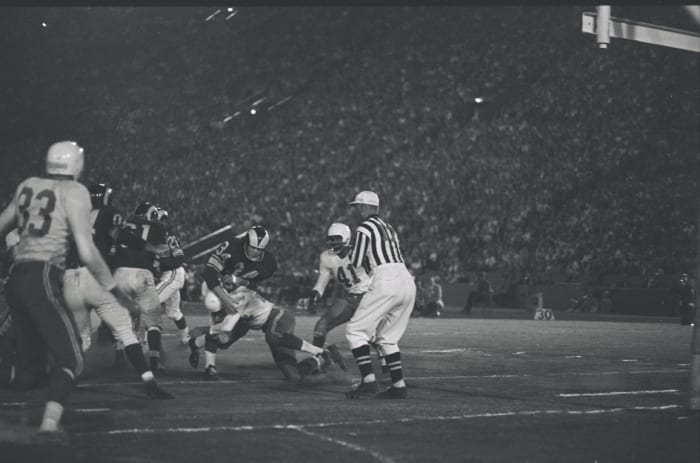
The Cardinals won the NFL championship in 1947 and posted a better record (11-1) in 1948, but Jimmy Conzelman's club lost its repeat bid in a Philadelphia blizzard. Conzelman surprised his team by quitting shortly after to devote more time to his advertising career. The Cards went in an atypical direction, naming assistants Phil Handler and Buddy Parker co-coaches. This experiment bombed. The '49 Cardinals went 6-5-1. After a 2-4 start, the Cards moved Handler to a different role. The team did not retain Parker at season's end. He then won two 1950s titles with Detroit. The Cardinals made three playoff berths over the next 49 years.
1956 Cleveland Browns

Paul Brown lured Otto Graham out of retirement before the 1955 season, and the Browns made it 10-for-10 in championship appearances (seven titles) with Graham. The all-time QB great stuck with retirement in 1956, leading the Cleveland dynasty into a new phase. The defending champions went 5-7, after starting 1-4. Veteran George Ratterman and future AFL star Babe Parilli could not keep the Browns on the championship level. Although this decline gave the Browns better draft real estate to allow for a Jim Brown pick in the 1957 draft, they won one championship during the legendary running back's stay and have not played for another title since.
1958 Detroit Lions
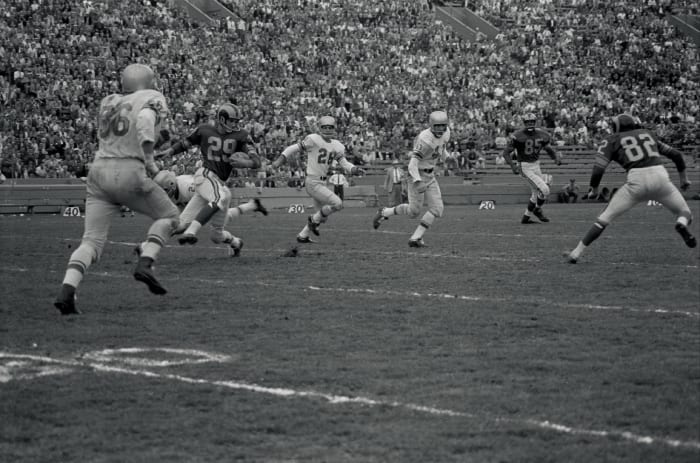
Bobby Layne was recovering from a broken leg when the Lions won the 1957 championship. Backup Tobin Rote led the way. Opting to move on from the hard-partying and recently injured Layne, the Lions stunned the best QB in their history by trading him to the Steelers in October 1958. Legend has it Layne declared the Lions would not win another title for 50 years. The 1958 team did not come close to defending its crown. The Rote-led Lions started 1-4-1 and won four games that season, which doubled as one of the worst by a defending champion. The Lions have not played for a championship since Layne's exit.
1964 Chicago Bears

The Bears rode a dominant defense to the 1963 championship, stopping MVP Y.A. Tittle's momentum. That turned out to be George Halas' final title. The follow-up did not come close to approaching the championship level. Chicago finished 5-9 in 1964, dropping near the bottom of the league on defense and seeing its run game crater. One of the Bears' top playmakers, halfback Willie Galimore, died in an offseason car accident. Late in the '64 season, the Bears drafted Dıck Butkus and Gale Sayers. Neither they nor young tight end Mike Ditka could stop a skid that lasted until Walter Payton's arrival over a decade later.
1964 New York Giants

Following the December 1963 loss to the Bears, Tittle attempted to lead the Giants to a fourth straight Eastern Conference title. The Giants' descent surpassed the Bears', with the former's Eastern title defense ending with a 2-10-2 record. Tittle finished with a 10-22 TD-INT ratio, after setting the NFL standard with 36 TD passes in 1963, and the Giants ranked last on defense. They had traded stalwart linebacker Sam Huff in the offseason. This season marked the end for Tittle and fellow Canton-bound star Frank Gifford. Two years later, the Giants sunk to 1-12-1. They did not resurface as a playoff team until Lawrence Taylor's 1981 rookie year.
1970 New York Jets

This season became a turning point on the Jets' timeline. Prized passer Joe Namath had missed one game in his first five seasons, despite prior knee trouble, but a broken wrist sidelined him for nine in 1970. This began a brigade of maladies for Broadway Joe, and the Jets have been looking for their next franchise QB since. These Jets were 1-4 with Namath, still just 27 at this point, and finished 4-10. Neither Don Maynard nor George Sauer, before the latter's early retirement at season's end, topped 550 receiving yards. Steady contenders during Namath's late-1960s peak, the now-NFL-stationed Jets did not make the playoffs in the '70s.
1973 Green Bay Packers
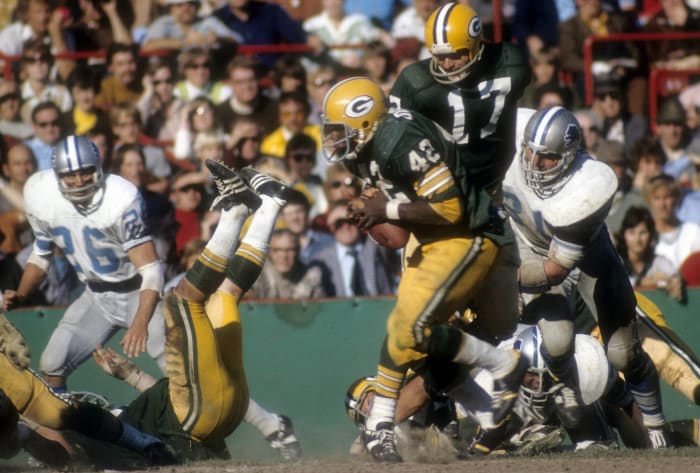
A bounce-back 1972 season featured contributions from future Hall of Famers Ray Nitschke and Dave Robinson. Both Vince Lombardi-era linebackers were gone by '73, with Robinson traded to Washington and Nitschke retiring during training camp. Issues at quarterback became the central concern for Dan Devine's team, however. Scott Hunter and first-round pick Jerry Tagge led a QB group that combined to throw just seven touchdown passes, and the Packers (5-7-2) ranked 22nd offensively. This woeful work led Devine to trade a monster haul for John Hadl during the 1974 season. That swing and miss cemented Green Bay's decline, and the slumber lasted until the 1990s.
1983 Tampa Bay Buccaneers

Despite their historically bad early years, the Buccaneers made the playoffs three times from 1979-82. They went 5-4 in the strike-shortened year. Doug Williams quarterbacked that team, but a 1983 holdout keyed his exit -- and a very bad trade. The Bucs acquired ex-first-round QB Jack Thompson from the Bengals for a first-rounder in June 1983. That pick became No. 1 overall in 1984, thanks to Tampa Bay's 2-14 season. The Bucs started 0-9 in '83, and as they battled injuries across the depth chart, Thompson showed he was not up to replacing Williams. This launched one of modern sports' worst periods; the Bucs did not finish over .500 again until 1997.
1990 Los Angeles Rams

Although the Rams only made one Super Bowl berth from 1973-89, the franchise booked 14 playoff appearances in that span. The Rams' run stopped in 1990. They dropped from 11-5 and a trip to the NFC championship game to 5-11 to start the '90s. Jim Everett started every game and made the Pro Bowl, but the Rams regressed on offense and defense. Despite rostering a prime Kevin Greene, Los Angeles ranked last in pass defense. The foundation from the Rams' 1980s success cracked, and the Anaheim-based team ended up leaving town after the 1994 season. From 1991-98, the Rams finished below .500 every year.
1991 Cincinnati Bengals

One of the most successful periods in Bengals' history ended swiftly. Three years after the Sam Wyche-Boomer Esiason partnership hit the NFL with a cutting-edge no-huddle offense and a Super Bowl berth -- and a year after a 9-7 season that ended in the divisional round -- the Bengals started 0-8 and finished 3-13. Founder Paul Brown died that summer, bringing about the scrutinized Mike Brown era, one that would produce five more starts of at least 0-7 through 2019. Although Cincinnati's defense was the primary culprit, ranking last, the team pulled the plug on Esiason as its unchallenged QB1 at season's end. Post-Esiason and Wyche, things only got worse.
1993 Washington

A steep freefall began from the top. Coming off a dominant 1991 Super Bowl-winning season and a divisional-round trek after a 9-7 season a year later, an aging Washington nucleus saw Hall of Fame-bound coach Joe Gibbs retire. Little has gone right without Gibbs for this franchise. The decline began with a 4-12 '93 season. Neither ex-Super Bowl MVP Mark Rypien nor future NFL MVP Rich Gannon fared well, and Washington's 1992 top-five pick on Desmond Howard proved a misstep. Gibbs defensive coordinator Richie Petitbon became a one-and-done head coach, and the franchise has not found true QB stability since Rypien's stint ended 30 years ago.
1994 Houston Oilers

One of the most spectacular declines in NFL history provided a runway for the Oilers' eventual relocation. Houston went 12-4 in 1993 but blew yet another playoff lead, wrapping a turbulent season. Owner Bud Adams began dismantling that core by trading Warren Moon to the Vikings. This laid the groundwork for a 2-14 season. Longtime backup QB Cody Carlson did not stick as a starter, and Moon's Run and Shoot receivers were now past 30. Houston's offense dropped from fourth to 28th, leading to coach Jack Pardee's midseason ouster. Interim HC Jeff Fisher did end up sticking around a while, but he was leading the Tennessee Oilers by 1997.
1995 Cleveland Browns

The ugliest decline happened as a midseason relocation announcement rocked a city. Coming off a 1994 season that included a playoff win, the Browns began the season as a Super Bowl contender. They ended the year 5-11 and Baltimore-bound. Owner Art Modell announced the Browns were moving to Baltimore on Nov. 6, 1995. The team lost its next five to fall well out of contention. This cost Bill Belichick his job and ended up spawning a second Browns franchise that has been a few cuts below the original. A draft-weekend 1995 trade ended up being extra salt in the wound, with a Browns-obtained first-round pick turning into the Ravens' Ray Lewis pick a year later.
1998 Kansas City Chiefs

Like the 1995 Browns, these Chiefs received preseason Super Bowl buzz. They were fresh off a 13-3 season and their second No. 1 defensive ranking in three years. After a 4-1 start, the '98 Chiefs finished 7-9, effectively taking one of the NFL's steadiest teams out of the mix for a while. The Chiefs lost six straight, bottoming out in an ugly 30-7 Monday night loss to the Broncos that featured a litany of late-game personal fouls. This season ended Marty Schottenheimer's 10-year Kansas City tenure and led to popular backup Rich Gannon leaving for Oakland. The Chiefs did not make the playoffs in consecutive years again until Andy Reid's arrival.
1999 Atlanta Falcons
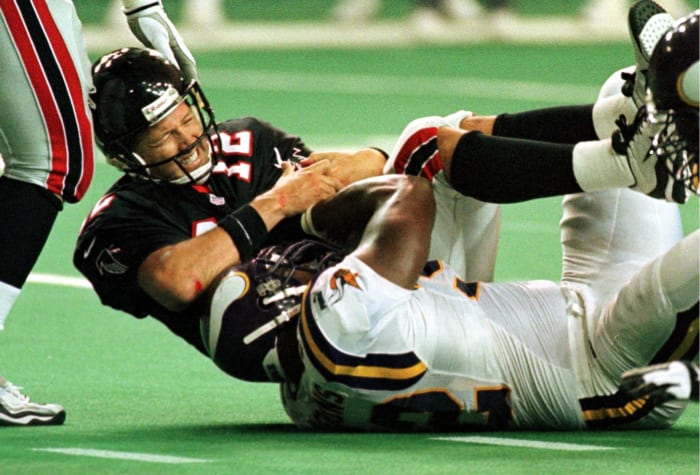
This season dealt a cruel blow to two stars and showed the grim consequences the running back position can bring. Super Bowl XXXIII's starting backs -- Terrell Davis and Jamal Anderson -- were All-Pros in 1998. Anderson had rushed for 1,846 yards to lead the Falcons to 14-2 and their first Super Bowl. He was never the same after a Week 2 ACL tear in 1999, which preceded Davis' career-derailing Week 4 tear. Atlanta also lost Chris Chandler for a stretch in a season that ended with a 5-11 record. The Falcons tailed off worse than the Broncos, starting 3-11, and finished outside the top 20 in offense and defense.
1999 Denver Broncos

John Elway left at the right time. Like Atlanta, the other 1998 Super Bowl entrant started 0-4. A week after Davis' prime-stopping injury, Shannon Sharpe suffered a season-ending broken collarbone. The Broncos dropped from 14-2 to 6-10, matching the worst win percentage for a defending Super Bowl champ. After Elway's retirement, Mike Shanahan chose second-year QB Brian Griese over the previous backup Bubby Brister. The young starter did not settle in until the following season, when Sharpe was in Baltimore and Davis was never the same. The Broncos were a playoff team in 2000, but their Super Bowl window had closed.
1999 San Francisco 49ers

A defining NFL changing-of-the-guard year brought the end of one of its signature dynasties. Aeneas Williams' crunching hit on Steve Young on a Week 3 Monday night ended the two-time MVP's career. The 49ers -- 12-4 in 1998 -- were forced to turn to CFL import Jeff Garcia. While Garcia would prove effective down the road, this season ended with the 49ers at 4-12. San Francisco had won at least 10 games in a staggering 16 straight years. Young's injury, which came as Garrison Hearst missed the first of two full seasons with a severe foot ailment, closed this storied period. In addition to the stars' injuries, the 49ers did not hold up on defense, ranking 30th.
2000 Jacksonville Jaguars

The Jaguars crafted the best expansion-team introduction in modern NFL history, going to the playoffs in four of their first five seasons. This included AFC title games in 1996 and 1999. After a 14-2 showing in '99, the Jags took a major step back. Their 2000 squad went 7-9. Its key offensive principals -- Mark Brunell, Fred Taylor, Jimmy Smith, Keenan McCardell -- were mostly healthy to form a top-10 unit. First-round wideout R. Jay Soward did not pan out, playing just one season, and big-ticket free agent Hardy Nickerson missed 10 games. The Jags did not return to the playoffs under Tom Coughlin and have not made consecutive playoff berths this century.
2002 Chicago Bears
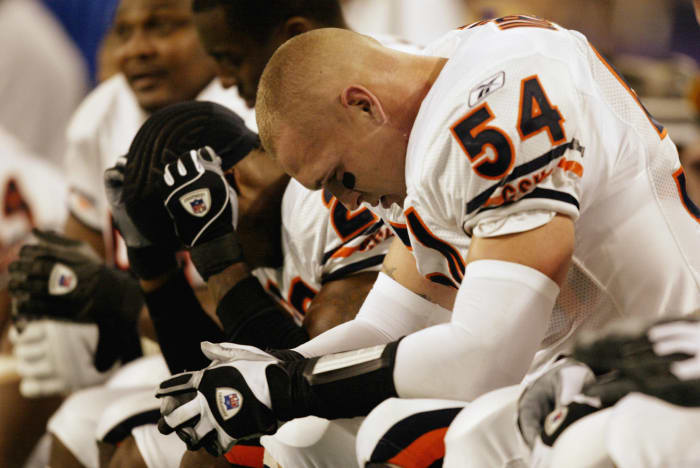
This season cast the 2001 Bears as a fluke, but their 13-3 year did center around one of the most productive defenses in modern NFL history. The '01 Bears' 12.7 points allowed per game ranks among the best in the 16-game era. In 2002, the Bears cratered, ranking 25th defensively and trotting out an even worse offense. Returning starter Jim Miller, who battled injuries all season, and a 37-year-old Chris Chandler started at quarterback during a six-game losing streak -- one that keyed a 4-12 record. This instability brought the Bears' Rex Grossman first-round pick in 2003, which did not stop a revolving door at quarterback.
2002 St. Louis Rams
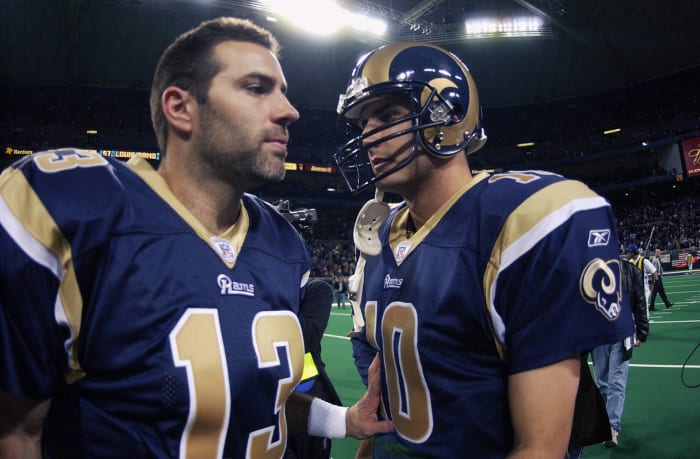
Only two Super Bowl teams have started the following season 0-5: a 1987 Giants team hindered by replacement players and these Rams. St. Louis went 14-2 in 2001, but Mike Martz's "Greatest Show on Turf" offense began to slip soon after. Kurt Warner's broken finger marred his 2002 season, though the Rams were 0-6 in the Hall of Famer's starts, and Marshall Faulk dropped from spectacular to merely good quickly. St. Louis ranked 23rd offensively. By 2003, Martz had benched Warner for Marc Bulger. The two-time MVP was gone by '04, and the primes of Faulk, Isaac Bruce, and Torry Holt ended quietly.
2003 Oakland Raiders

After taking Jon Gruden's old team to Super Bowl XXXVII, Bill Callahan did not come close to replicating that ascent. The Raiders' prominent old-guy contingent was cooked by 2003 when the team dropped from 11-5 to 4-12. Rich Gannon's midseason injury doomed this team, but it was already 2-5 with the reigning MVP. Oakland's offense sank from second to 26th, with the Tim Brown-Jerry Rice tandem combining for four receiving TDs after a 1,000-1,000 season. 2003 was bad enough to force Callahan out after just two years; Brown and Rice finished the '04 season elsewhere as well. The Raiders have gone through a few rebuilds since.
2005 Philadelphia Eagles
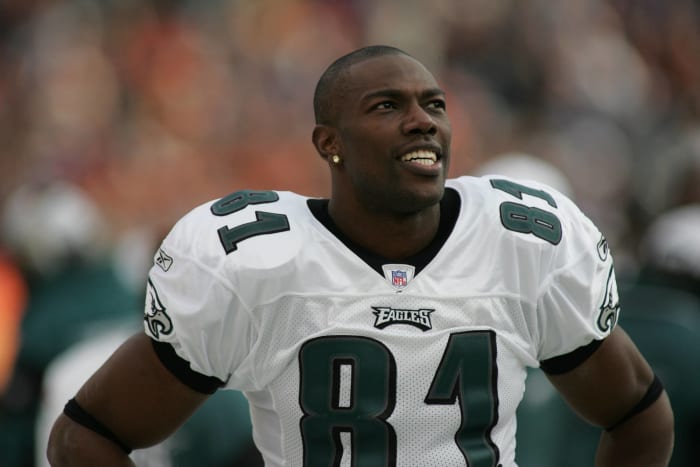
Antonio Brown made a run at the diva receiver championship belt in 2019, but Terrell Owens' 2005 is tough to top. The All-Pro steered his way to Philly in 2004 and made a major difference for a wideout-needy Eagles team, helping them to Super Bowl XXXIX. By 2005, Owens' act wore thin. Criticism of Donovan McNabb, shouting matches with Andy Reid, driveway sit-ups and various other T.O.-driven headlines engulfed the '05 Eagles, who dropped from 13-3 to 6-10. The Eagles suspended Owens in November; he never suited up for the team again. This season halted the Eagles' run of four straight NFC title game cameos. They cut Owens in 2006, leading him to Dallas.
2011 Indianapolis Colts

Perhaps the most predictable decline here, the Colts were quickly toast without their all-time QB great. Peyton Manning's neck injury was not viewed as a season-ender until late that summer. The Colts had given Manning a five-year extension that July. His year off exposed a flawed foundation, and the Colts dropped from 10-6 to 2-14. By 2012, the Manning-Jim Caldwell-Bill Polian power structure was gone. Indianapolis -- also quite bad defensively -- tried the likes of Kerry Collins, Curtis Painter, and Dan Orlovsky and started 0-13. Two wins still enabled the Colts to sufficiently #SuckforLuck, with Manning heading to Denver.
2013 Houston Texans

Manning's injury opened the door for the Texans to break through in the AFC South, and the Matt Schaub-quarterbacked squad won the division in 2011 and '12. The 2012 Texans blew a home-field advantage chance but still finished 12-4. Schaub quickly breaking down as a starter at age 32 relegated the Texans to the NFL's basement. They finished 2-14, closing with 14 straight losses. Adding to the offense's issues: Arian Foster's midseason back injury. The unit finished 31st, undercutting any dominance J.J. Watt offered. The Texans fired Gary Kubiak during his eighth season, and Schaub's ensuing exit brought in a few one-and-done QBs.
2013 Washington

After claiming the Offensive Rookie of the Year prize over Andrew Luck and Russell Wilson, Robert Griffin III did not stay on his top peers' pace. The knee injury that knocked RG3 out of Washington's 2012 playoff loss doomed the ex-Heisman winner, who never recaptured his rookie form. Washington fell from 10-6 to 3-13, and the player for whom Washington dealt three first-round picks ended his rookie contract as Kirk Cousins' backup. The defending NFC East champs lost their final eight games, deploying a defense worse than a newly limited offense. This led to Mike Shanahan's ouster and, eventually, the franchise's perpetual QB uncertainty returning.
2016 Carolina Panthers

Super Bowl 50 changed Cam Newton's career, and the immediate follow-up effort began the superstar's gradual descent. The runaway 2015 MVP's lackluster effort in Santa Clara preceded a nine-win Panthers decline. Carolina went from 15-1 to 6-10. Its franchise quarterback suffered a trajectory-altering shoulder injury in 2016. Luke Kuechly also missed six games due to a concussion, providing an unfortunate prelude of a dynamic talent's early NFL exit. While the Panthers were back in the playoffs by 2017, Newton remained on a downhill slope. Carolina remains in search of his true successor.
2017 New York Giants

This season brought the beginning of the end for Eli Manning and introduced adversity from which Odell Beckham Jr. has not recovered. Propped up by Beckham and defensive free agents Olivier Vernon, Janoris Jenkins, and Snacks Harrison, the 2016 Giants went 11-5 and made the playoffs. They went 3-13 in a 2017 season that featured an OBJ broken ankle and Ben McAdoo benching Manning. The QB's 210-start streak ending turned into one of the more seminal demotions in modern NFL history; McAdoo and GM Jerry Reese were gone the next day. Hitting their modern nadir, the Giants did not avoid double-digit losses again until 2022.
2020 Philadelphia Eagles

The Eagles have come out clean on the other side of this disaster, voyaging to Super Bowl LVII. It came after the pillars of their Super Bowl LII team tumbled down in a 4-11-1 season. This abruptly ended the Carson Wentz-Doug Pederson period. Following the Super Bowl triumph, the Eagles made the playoffs in 2018 and '19, going 9-7 in the latter slate despite injuries ravaging Wentz's receiving corps. Injuries continued in 2020, but Wentz began a downfall he has been unable to reverse. The Eagles fired Pederson and traded Wentz in 2020; the Colts and Commanders have since jettisoned the QB. But the Eagles drafting Jalen Hurts as a Wentz backup provided a quick rescue.
2022 Arizona Cardinals

The Cardinals' first playoff berth in six years gave way to rapid deterioration. Arizona went 11-6 in 2021, after starting that season 10-2. Although the Rams pummeled a sinking Cards team in the wild-card round, Kyler Murray, Kliff Kingsbury and Steve Keim received extensions. After a 4-13 season, only Murray is left standing. The Cards including a film-study clause in the QB's deal (and then removing it after backlash) provided an ugly harbinger. Murray fell off the Pro Bowl tier before suffering a torn ACL. He bickered with Kingsbury, whose team lost its final seven as depressing "Hard Knocks" episodes aired. Keim and Kingsbury's contracts run through 2027.
2022 Los Angeles Rams

In February 2022, the Rams threw out an armada of stars to topple the Bengals in Super Bowl LVI. By January 2023, they were starting waiver claim Baker Mayfield. Cooper Kupp and Aaron Donald joined Matthew Stafford in missing the entire Mayfield-L.A. stint, but they were available for much of the worst Super Bowl title defense in NFL history. The Rams fell from 12-5 -- a team that employed Von Miller and Odell Beckham Jr. and saw Stafford outduel Tom Brady and Joe Burrow in the playoffs -- to 5-12, as a battered O-line helped sideline Stafford. The Rams paid Stafford, Kupp and Donald in 2022; in 2023, Sean McVay's team is shedding salary.
Sam Robinson is a Kansas City, Mo.-based writer who mostly writes about the NFL. He has covered sports for nearly 10 years. Boxing, the Royals and Pandora stations featuring female rock protagonists are some of his go-tos. Occasionally interesting tweets @SRobinson25.
More must-reads:
- Winners and losers from Day 2 of the 2024 NFL Draft
- Four players on the hot seat because of team's recent draft selections
- The '100 catches in an NFL season' quiz
Breaking News
Customize Your Newsletter
 +
+
Get the latest news and rumors, customized to your favorite sports and teams. Emailed daily. Always free!
Use of this website (including any and all parts and
components) constitutes your acceptance of these
Terms of Service and Privacy Policy.

